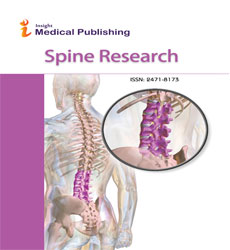Abstract
Diffusion Tensor Imaging and Fibre Tracking Biomarkers of Intramedullary Tumours of Spinal Cord for Predictive Resectabality Scoring - An Observational Comparative Study of 48 Cases
Background: The aim of this prospective observational comparative study is to evaluate the role of Diffusion Tensor Imaging (DTI) in management of intramedullary spinal cord tumours (IMSCT) for predicting ’safe resectability’ to assess subsequent neurological outcomes.
Methods: DTI was performed in 65 patients (38 male and 27 females with a mean age of 37.5 years) with IMSCT (intramedullary spinal cord tumours) and conventional contrast enhanced MRI. DTI parameters to predict the margin for tumour resectabiity included ‒ Medium resolution DTI (Diffusion Tensor Imaging) on a 3T MRI (Philips Ingenia scanner) with following parameters: Axial Plane B values: 0,1000; Number of directions, 15; TR 6248 TE 60; Slice thickness, 2 mm; inter slice gap, 0.5 mm; NSA, 2 and bandwidth 29.8. Tumour matrix fractional anisotropy (FA), tumour cord interface FA and tractograms were, correlated with intraoperative findings and neurological outcomes after surgery and lesions were grouped as ‒ completely resectable, partially resectable and unresectable.
Results: There were significant margins in DTI parameters in 65 patients in this study. 50 were neoplastic (19 ependymomas, 14 astrocytomas, 3 metastases, 4 haemangioblastoma, 5 cavernomas, 5 lipomas); 15 were non neoplastic. DTI was used to classify the lesions as completely resectable (n=18), partially resectable (26) unresectable (6). Two patients were lost for follow up. Spearman’s correlation coefficient between DTI prediction of cleavage plane and intraoperative finding of plane was 0.84 (p-value<0.001). Correlation coefficient between DTI prediction of infiltration of tracts and neurological outcome was 0.46 (p-value<0.02). Lesions demonstrated as resectable by DTI had a good outcome (61.1% vs 0.0%; p<0.001); significantly higher number of patients had poor outcome if DTI concluded lesion was nonresectable (19.4% vs 66.7%; p=0.015).
Conclusion: This study suggests that DTI plays a significant role in predicting pre-operative, safe resectability of IMSCT.
Author(s):
Rammohan Vadapalli*, Vijayasaradhi Mudumba and Abhinav Sriram Vadapalli
Abstract | Full-Text | PDF
Share this

Google scholar citation report
Citations : 128
Spine Research received 128 citations as per google scholar report
Abstracted/Indexed in
- Google Scholar
- China National Knowledge Infrastructure (CNKI)
- Directory of Research Journal Indexing (DRJI)
- WorldCat
- International Committee of Medical Journal Editors (ICMJE)
- Secret Search Engine Labs
- Euro Pub
Open Access Journals
- Aquaculture & Veterinary Science
- Chemistry & Chemical Sciences
- Clinical Sciences
- Engineering
- General Science
- Genetics & Molecular Biology
- Health Care & Nursing
- Immunology & Microbiology
- Materials Science
- Mathematics & Physics
- Medical Sciences
- Neurology & Psychiatry
- Oncology & Cancer Science
- Pharmaceutical Sciences

